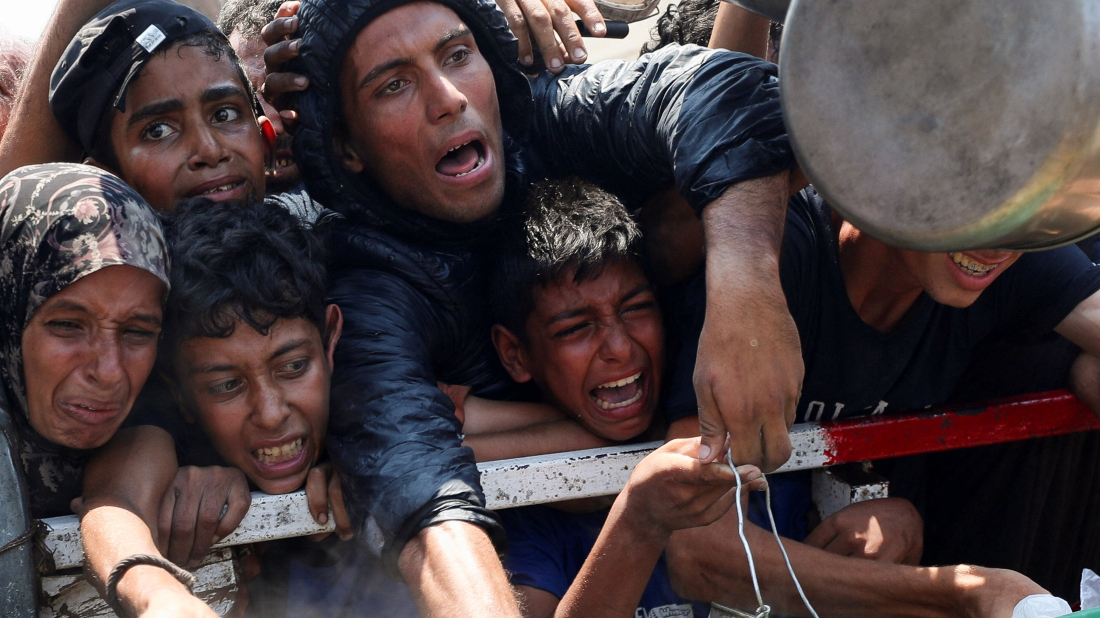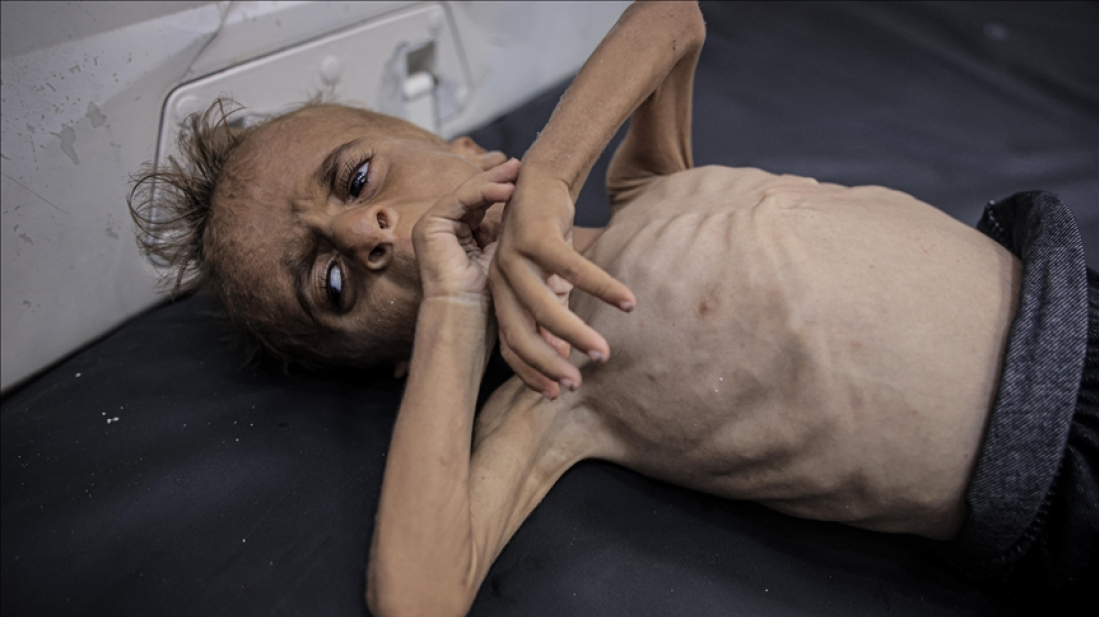Trump says additional talks with Iran expected on Friday
Tensions between the U.S. and Iran are escalating, with Washington ordering a significant military build-up in the region and multiple countries evacu...

One in four children and pregnant women in Gaza are suffering from malnutrition, the medical charity Doctors Without Borders (MSF) has warned, as hunger-related deaths mount according to local authorities and the Israeli siege continues to deprive the population of basic necessities.
“Over the past few weeks, the number of admitted children under the age of 5 suffering from acute malnutrition has tripled,” said Enass Abu-Khalaf, MSF’s communications chief for the Middle East and North Africa.
“One in every four children and pregnant women are suffering from malnutrition. On a daily basis, we admit around 25 malnutrition cases.”
The warning comes as Gaza’s Health Ministry reported 14 more deaths from hunger and malnutrition on Monday (28 July), including two children, bringing the total to at least 147 since 7 October, 2023.
Among the dead are at least 88 children.

The United Nations World Food Program described the latest Integrated Food Security Phase Classification (IPC) report as not just a “warning” but a critical “call to action.” The report cited a worsening famine scenario due to ongoing military operations, widespread displacement, and the breakdown of food and medical access.
Among the clearest examples of this deepening crisis is the story of one-and-a-half-year-old Mohammad Al-Motawwaq, whose emaciated body has come to symbolize the impact of starvation on Gaza’s youngest victims.
In a makeshift tent in western Gaza City, Mohammad Al-Motawwaq lies motionless, his withered body a stark image of Gaza’s spiraling hunger crisis.
Images of Mohammad have circulated online, with some Israeli social media users denying that malnutrition is to blame.
However, Suzan Marouf, a clinical nutrition specialist at the Patient Friend’s Hospital, confirmed that his condition deteriorated directly due to a lack of food and medical supplies.
“The medical issues he had weren’t significantly affecting his weight,” Marouf said. “But once the siege and the closure of crossings depleted hospitals’ medicine stocks and nutritional supplements, Mohammad’s condition deteriorated to acute malnutrition.”
Mohammad had been diagnosed with moderate malnutrition and congenital issues, including brain complications and muscle atrophy.
Doctors had been stabilizing him with the last of their nutritional resources before they ran out.
Marouf warned that child deaths from hunger are likely to rise “if the current situation continues.”
As child malnutrition cases surge, Gaza’s hospitals are buckling under the strain, lacking even the most basic resources to provide adequate care.
Like many medical facilities in Gaza, Patient Friend’s Hospital is operating without baby formula, supplements, or enough beds—forcing two children to share a single mattress.
MSF facilities are facing similar breakdowns, especially in neonatal care. “We don’t have enough incubators. We don’t have formula for premature babies. Even our intensive care units are struggling,” said Abu-Khalaf.
She added that the situation in Gaza, where MSF has worked continuously for 25 years, is worse than ever.
Mohammad’s mother, Hidaya Al-Motawwaq, said her son has lost nearly 3 kilograms in recent weeks.
“Before the latest displacement, Mohammad weighed 9 kilograms. At that time, food was available, and we could meet our children’s needs,” she said.
“But now the occupation is waging war on us and our children. The lack of food and the ongoing famine have deeply affected my son Mohammad,” she added.
She said he once responded well to physical therapy and proper nutrition, even standing and laughing like other children. “But now, with skyrocketing prices, I can’t even provide him with formula milk or diapers.”
Following the family’s most recent displacement, Mohammad’s condition rapidly worsened.
Severe malnutrition led to further muscle atrophy, serious health complications, and left him unable to stand or move.
“Sometimes, when Mohammad wakes up crying at night, I give him water instead of milk—just to silence his hunger,” she said.
Hidaya appealed to the international community. “Please look at my son Mohammad’s case and provide him with the most basic things — his daily milk and diapers.”
MSF has repeatedly called for a ceasefire and the lifting of the siege, but those appeals have gone unheeded.
“This is a turning point in the history of humanitarian aid,” Abu-Khalaf said. “What is entering Gaza today is a drop in the ocean.”
In November, the International Criminal Court issued arrest warrants for Israeli Prime Minister Benjamin Netanyahu and former Defense Minister Yoav Gallant for war crimes and crimes against humanity in Gaza.
Gaza's food stocks have been running out since Israel cut off all supplies in March. That blockade was lifted in May but with restrictions that, Israel says, are needed to prevent aid being diverted to Hamas.
Also, Israel denies it's using starvation as a weapon. On Tuesday Foreign Minister Gideon Saar called claims of starvation “lies.”
Last Sunday Israel announced a halt in military operations for 10 hours a day in parts of Gaza and new aid corridors as Jordan and the United Arab Emirates airdropped supplies into Gaza.
Tensions between the U.S. and Iran are escalating, with Washington ordering a significant military build-up in the region and multiple countries evacuating diplomatic staff amid fears of further instability.
The death toll from heavy rains and flooding in Brazil’s Minas Gerais state has risen to 46, authorities said, with 21 people still reported missing. The storms triggered landslides and widespread flooding, displacing thousands across Juiz de Fora and Uba.
The situation in Cuba was heating up and called for restraint following a deadly incident involving a Florida-registered speedboat off the coast of the Caribbean island, the Kremlin said on Thursday (26 February).
Venezuela’s Attorney General Tarek William Saab and Ombudsman Alfredo Ruiz tendered their resignations to the National Assembly on Wednesday. Neither official has publicly provided reasons for stepping down.
Pakistani air strikes hit a weapons depot on the western outskirts of Kabul overnight, triggering hours of secondary explosions that rattled homes across the Afghan capital and left residents fearing further violence.
Tensions between the U.S. and Iran are escalating, with Washington ordering a significant military build-up in the region and multiple countries evacuating diplomatic staff amid fears of further instability.
Two people were killed and around 40 injured when a tram derailed in central Milan on Friday (27 Februrary), a spokesperson for local firefighters said.
Colombia’s commerce minister, Diana Marcela Morales, has said she will propose raising tariffs on certain Ecuadorian goods from 30% to 50%, as a trade dispute between the neighbouring countries intensifies.
Former U.S. President Bill Clinton said on Friday (27 February) that he had no knowledge of the crimes committed by Jeffrey Epstein and would not have flown on the late convicted sex offender’s plane had he had any inkling of his activities.
Some of Iran's most highly enriched uranium, close to weapons grade, was stored in an underground area of its nuclear site in Isfahan, the UN nuclear watchdog said in a confidential report sent to member states on Friday (27 February).
You can download the AnewZ application from Play Store and the App Store.

What is your opinion on this topic?
Leave the first comment